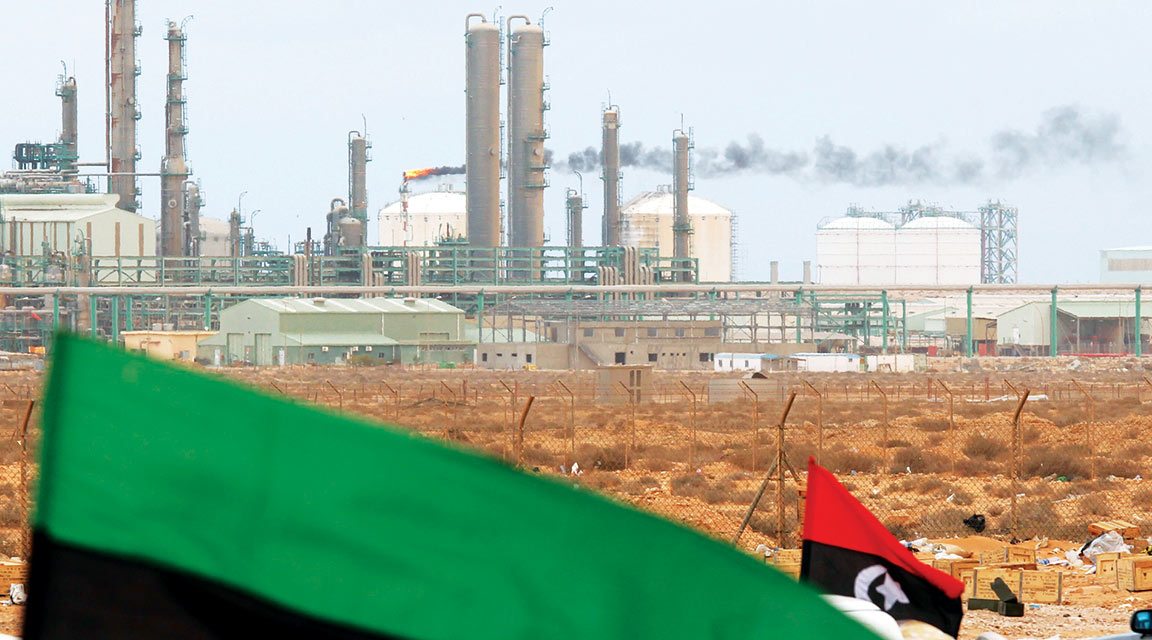

Libya’s National Oil Corporation (NOC) is working on plans to boost its oil production capacity by more than a quarter to 1.6 million barrels a day (b/d), putting it at the same level it was producing at before the 2011 revolution.
The country is currently producing around 1.25 million b/d, its highest level in years, but output is constrained by a chronic lack of investment and attacks on its infrastructure.
Plans outlined by NOC chairman Mustafa Sanalla at a conference in Benghazi on 24 October, include rehabilitating and expanding the country’s pipeline network, according to a report from Bloomberg. Sanalla did not provide any further details on where the increased output would come from.
Along with raising oil output, the effort will require major investments in the midstream sector to repair damaged pipelines and restore the country’s storage capacity. Ras Lanuf, one of Libya’s most import oil export terminals for example, has only four storage tanks that are still operational after a number were damaged during fighting between rival militias in June. This leaves it with just 1 million barrels of storage capacity, which is not enough to cover any disruption to loading operations for more than a few days.
Libya’s production is about 1.25 million b/d, its highest level in years, but it remains vulnerable to conflict, with the country split between political factions based in Tripoli and the east. Sanalla has previously spoken of Libya’s potential to eventually boost output to about 2 million b/d, but this will require massive investments and a sustained period of political stability.
The Benghazi conference, in the city where Libyans began their revolution against Muammar Gaddafi in 2011, was Libya’s first major oil event inside the country for years. It was “an important step, encouraging the return of further investment and international partners to work in Libya,” Sanalla said.
Libya’s second largest city is also significant for another reason, as the home of a rival national oil company, known as NOC East, which has sought to sign its own oil contracts and sell oil independently. Oil buyers have steered clear of dealing with NOC East so far with the international community backing Sanalla’s NOC.
NOC East is backed by the Tobruk-based House of Representatives, a rival government to the Presidency Council in Tripoli. They have complained for years that revenues from Libya’s oil sales have not been fairly distributed, and accuse the Council of corruption.
“I would like to use this opportunity to stress the importance of transparency to ensure the fair distribution of oil revenues across the country. Every Libyan citizen has the right to see how every dinar of their oil wealth is spent,” Sanalla said, according to NOC’s website.
Investment needs
NOC and its current partners have had some recent successes in raising oil and gas output, despite the challenges. Mellitah Oil and Gas, a joint venture of Eni and NOC announced significant gains at the Abu Attifel oil field earlier in October raising condensate production by 2,000 b/d to 9,500 b/d using new gas turbine. Well maintenance work will also help add another 1,000 b/d by the end of the year.
These kinds of incremental gains are important, but hitting 1.6 million b/d by the end of next year will require much more investment, that is only slowly trickling back to the country. On 8 October, UK oil major BP and Italy’s Eni signed a letter of intent with NOC to resume oil exploration in the embattled North African country next year.
The agreement covers an existing exploration and production-sharing agreement (EPSA), which includes three areas — two in the onshore Ghadames basin in the northwest and one in the offshore eastern Sirte basin.
Originally awarded in 2007 to BP, work in the 54,000 square kilometre contract areas has been suspended since 2014. The combined efforts of BP and Eni, already Libya’s largest oil producer, could help unlock significant volumes of crude.
The latest announcement follows agreements with Gazprom and Tatneft, two Russian energy companies, that are also lining up to return to resume exploration activities in the country’s oil and gas sector.
You might also like...

Hassan Allam and Siemens confirm Hafeet Rail award
24 April 2024

UAE builds its downstream and chemical sectors
24 April 2024

Acwa Power eyes selective asset sales
24 April 2024

Bahrain mall to install solar carport
24 April 2024
A MEED Subscription...
Subscribe or upgrade your current MEED.com package to support your strategic planning with the MENA region’s best source of business information. Proceed to our online shop below to find out more about the features in each package.





